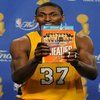drza wrote:So, as for what I'm looking for in a push-back argument for J? Maybe something like an argument that he really was a dominant defensive player, with maybe evidence of playoff match-ups where he shut his guy down or a study showing that his team's defensive rating appears to be tied to him. Or, evidence that he was a more dominant playmaker. I know in the ABA he could put up solid assist numbers and lead his team...did he show that skill on any level in the NBA, or did that go away with the "bad fit" of the team? And speaking of the bad fit...maybe proof that he was able to modify his game to push his team towards elite in a tangible way that isn't immediately obvious. Something. Something besides just a list of his accolades, basic box score stuff, or broad-strokes descriptions of the positives of his skillset. I know the basics on him, and I can go to B-R for the other general info. Teach me something I don't know.
Well, there seems like a big defensive impact in the ABA at times, though there's a lot of mud in the water, too....
The '73 Nets were +3.2 rDRTG team (8th of 10), and went 30-54. In '74 they get Dr. J and improve to an elite -4.6 rDRTG (1st of 10) and 55-29 record (win title, too).
The mud in the water is that he wasn't the only roster shake-up. Really the only principle players consistent between the two teams were Billy Paultz at C, Bill Melchionni at PG, and SG (and defensive specialist) Brian Taylor. They lost Trooper Washington, leading scorer SG/SF George Carter, and C Jim Chones. They obtained Erving, but also got rookies Larry Kenon and Super John Williamson, and back-up C Willard Sojourner (few other minor changes, too). So it's hard to say how much he's responsible for that dramatic improvement.
They're an even better -5.8 rDRTG in '75.
In '76, they're still #1 defensively (though only -2.4 rDRTG), and this while Brian Taylor missed 30 games. That season does appear remarkable in that he leads the team [sometimes handily] in ppg, rpg, apg, spg, bpg, and *TS% (*for all players with at least 500 minutes played). Erving was their
everything: primary scorer, playmaker, rebounder, and defensive anchor.......and that team won the ABA title.
I know this accomplishment is called into question based on the assumption that the ABA [and NBA] were watered down at this stage.
otoh, I'll use an argument similar to one that has been presented for Bill Russell when faced with the declaration that he fairly consistently had fantastic supporting casts......and it went something like this: "What would you expect a GOAT-level player to accomplish with good/great supporting casts? You'd expect him to dominate the league and win (or contend for) the title year after year......which is exactly what Russell did."
How a similar argument applies to Erving?: "What would you expect an all-time great player to do to a water-down league? You'd expect him to crush it to a degree rarely seen, and potentially even carry a mediocre cast to a title......which is exactly what Erving did in '76."
But I don't have a great answer for wrt his prime in the NBA. You've got me wavering on my 2nd vote here, enough so that I think I may switch it to Robinson (who does look amazing on all my studies, and I don't want to be guilty of deciding hairline choices based on where players "should be" [conventionally]).
"The fact that a proposition is absurd has never hindered those who wish to believe it." -Edward Rutherfurd
"Those who can make you believe absurdities, can make you commit atrocities." - Voltaire






































